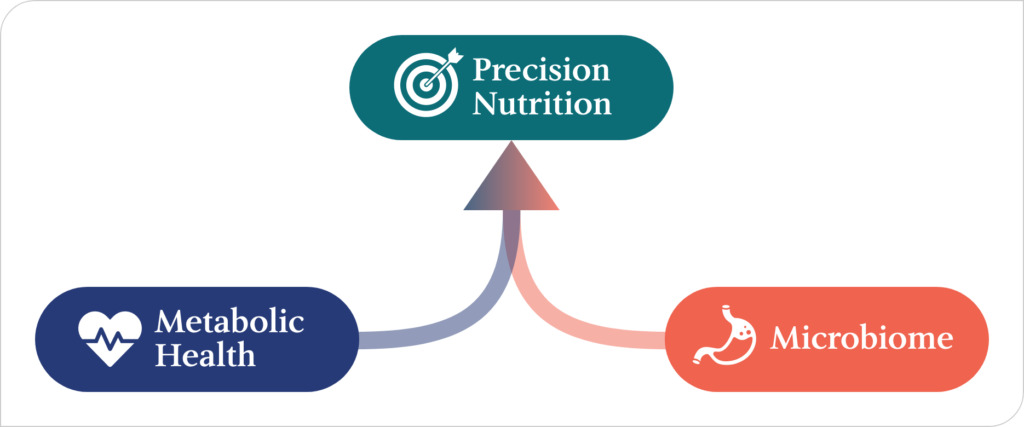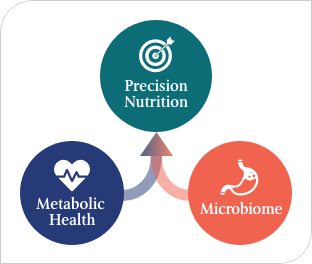Our team of scientists and physicians at the Scripps Research Digital Trial Center have thought the same thing. That’s why we’re digging into the exciting, new field of precision nutrition, with the help of partners like you. By enrolling in the PRediction Of Glycemic RESponse Study (PROGRESS), you can help us better define precision nutrition.
About the Study
The spiraling lines of your fingerprint and the strands of your DNA set you apart from everyone else. But if you’ve ever wondered what else makes you unique—aside from what’s determined by your genes—you’re not alone.
This subject, in a nutshell, explores how our bodies react to food and its impact on different functions. It also plays a notable role in how we may prevent many of today’s greatest health challenges.

A Message From Our Principal Investigator
Ed Ramos, PhD, Director, Digital Clinical Trials, Scripps Research
“For me, it always comes back to family. I want to make sure that I don’t ignore my family’s health history of type 2 diabetes and heart-related issues. And at the same, I also want to make sure that I can beat my three kids in a foot race. But achieving this mix of large and small health goals that I have is only possible if I understand…me.”
A Message From Our Principal Investigator
Ed Ramos, PhD, Director, Digital Clinical Trials, Scripps Research

“For me, it always comes back to family. I want to make sure that I don’t ignore my family’s health history of type 2 diabetes and heart-related issues. And at the same, I also want to make sure that I can beat my three kids in a foot race. But achieving this mix of large and small health goals that I have is only possible if I understand…me.”
For more from Ed, check out Science Changing Life 25: Reversing diabetes with personalized nutrition, where he talks with Drew Duglan about empowering the individual with wearable health devices, the worst foods for spiking our blood sugar and the importance of lifelong flexibility.
The Growing Field of Precision Nutrition
Discover how what you eat, what’s in your gut, and other factors all can inform precision nutrition. Explore the graphic below to learn more.
The Growing Field of Precision Nutrition
Discover how what you eat, what’s in your gut, and other factors all can inform precision nutrition. Explore the graphic below to learn more.



 Precision Nutrition
Precision Nutrition
Precision nutrition is a growing field of research. It uses a person’s biodata to determine the changes they can make to be more healthy. What makes the field stand out, though, is the specificity it can provide for healthcare teams and people like you. Instead of looking at your medical chart and saying that you should eat more leafy greens, for example, your doctor could tell you which types of leafy greens are processed best by your body.
Wearable technology—such as devices that track your blood sugar or activity—help make this possible. When you eat an apple, for instance, a continuous glucose monitoring (CGM) system can record how fast and well your body uses sugar from that piece of fruit for energy. That CGM data could be used to better understand how you, and others like you, digest certain foods.
Those insights can also suggest how food impacts your body in less immediate ways. Believe it or not, that apple could make a difference on your digestion, how well you sleep, and even your mental health. And new tools and technology continue to open doors for us to learn more.
Data tied to all of these elements, provided by participants like you, are the building blocks of precision nutrition and of PROGRESS.

 Metabolic Health
Metabolic Health
More than a number on the scale, your metabolic health offers clues to your risks for heart disease, diabetes, and other issues. It’s mainly determined by your blood sugar and cholesterol levels, blood pressure, and weight.
Unfortunately, it’s also a problem for 52% of U.S. adults who have metabolic diseases. This means that, at a cellular level, their bodies struggle to convert food to energy. Diabetes is a common example of a metabolic disease, affecting over 100 million U.S. adults. Breaking it down more, nearly 4 in 10 have prediabetes, and 1 in 7 have type 2 diabetes.
The good news is that there are ways to prevent or reverse these two conditions. Eating better, being active, talking to a healthcare provider, and watching the scale are all proven to help.
And here’s even more good news: precision nutrition will allow us to take what’s tried and true to the next level.
Findings collected from PROGRESS will build upon the field of precision nutrition. In turn, that may give healthcare providers more information on how to tailor their treatments. Instead of just telling someone to exercise more often, they could tell them how often they’d need to do so for the most optimal results. And rather than instructing them to eat healthier foods, they could identify which foods to eat and avoid, based on each person’s microbiome. This “made-for-you” approach may make it easier for patients to take the steps to improve their metabolic health and well-being.

 Microbiome
Microbiome
There are more bacteria living inside of you than you can count. Don’t worry, that’s a good thing—because many of these microorganisms help keep you healthy. They make up what’s known as your microbiome. Or, in other words, the ecosystem of bacteria that live in your gut.
Although humans share 99% of the same DNA, each person’s microbiome is like a fingerprint. This holds true even among people who are closely related, like twins. In fact, the differences go beyond how much of each type of bacteria we have in our guts. Within each bacteria type, there are also different sets of genetic strains. The sets vary from person to person, making us ever more unique.
However, your genes are only part of the bigger picture. The foods you eat have a huge impact on the makeup of your microbiome, and can affect the levels of “good” and “not-so-good” gut bugs that call it home. Research has shown that sets of these bacteria match up with certain food and dietary patterns, for better or for worse. Where your foods come from, whether they’re processed or unprocessed, and other factors all play a role in these trends as well.
As you can imagine, how well your microbiome is doing its job affects the way you digest food day after day. But it makes its mark on more than your digestive system, and it does so on your short- and long-term health. Research also shows that the trillions of organisms that live in your gut may play a surprising role in conditions like depression and diabetes, too.
Through PROGRESS, we’re diving deeper into this link. The more we learn about the microbiome, the easier it may be for your doctor to know which foods support the “good” bacteria in your gut. These insights may support greater health for you and others, while furthering the impact of precision nutrition.
Anyone, Anywhere
Transforming how and where clinical research is done.
 The Scripps Digital Trials Center is transforming how and where clinical research is done. We are advancing science with an approach that invites anyone, anywhere to raise their hand and contribute to and benefit from medical research. Our most valued partners are the tens of thousands of participants who volunteer for our research studies. Without them, our work would not be possible.
The Scripps Digital Trials Center is transforming how and where clinical research is done. We are advancing science with an approach that invites anyone, anywhere to raise their hand and contribute to and benefit from medical research. Our most valued partners are the tens of thousands of participants who volunteer for our research studies. Without them, our work would not be possible.
Anyone, Anywhere
Transforming how and where clinical research is done.
 The Scripps Digital Trials Center is transforming how and where clinical research is done. We are advancing science with an approach that invites anyone, anywhere to raise their hand and contribute to and benefit from medical research. Our most valued partners are the tens of thousands of participants who volunteer for our research studies. Without them, our work would not be possible.
The Scripps Digital Trials Center is transforming how and where clinical research is done. We are advancing science with an approach that invites anyone, anywhere to raise their hand and contribute to and benefit from medical research. Our most valued partners are the tens of thousands of participants who volunteer for our research studies. Without them, our work would not be possible.
How Do I Get Started?
Find the answers to the most common questions about PROGRESS below. Need more information? Contact us today.
Why should I participate in PROGRESS?
Your data will help us better understand how different people process nutrients over time. It all supports our goal for PROGRESS: to give researchers a window into metabolic health like never before. What you share today could shape how we approach health tomorrow.
What will I receive in return?
Understanding what makes your blood sugar rise and fall is a major goal of PROGRESS. But it’s not all about what you eat. We will provide you with free tools that monitor your blood sugar in real time, as well as a fitness device to help you track your physical activity, sleep behaviors, and heart rate. As you complete each study activity, you’ll earn points that can be redeemed for gift cards and learn from your health data firsthand. What you discover could challenge and change how you live, and lead to findings that support better overall health. Not just for you, but for your loved ones, community, and even those you’ve never met.
What information will you collect from me?
If you’re enrolled in PROGRESS, you’ll be asked to complete the following actions—all from your home:
- Download and use study-approved smartphone apps
- Connect your electronic health records (EHR)
- Provide blood, saliva, and stool samples
- Wear study-provided sensors and monitors, while tracking what you eat for 10 days
- Share health information (like physical activity, sleep, and blood sugar)
How do I join?
We’re looking for 1,000 participants for PROGRESS: 500 people with type 2 diabetes, and 500 without. Enrolling now! Sign up now to secure your screening spot.


